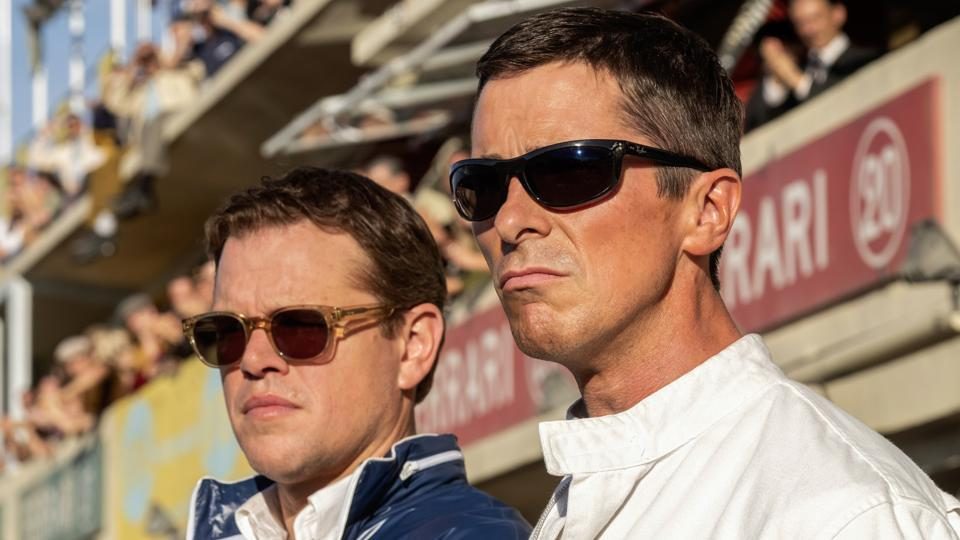Ford v Ferrari
Director – James Mangold
Cast – Christian Bale, Matt Damon, Jon Bernthal, Josh Lucas, Cationa Balfe, Tracy Letts
Both as a racing drama and as an excellent example of the sort of movie that Martin Scorsese believes isn’t made anymore, Ford v Ferrari is exquisite. Directed by a filmmaker in near total command of his craft, James Mangold’s carte blanche follow-up to Logan is the closest any recent film has come to replicating the indescribable feeling of watching a real race.
It is pulse-pounding and propulsive, despite a two-and-a-half hour runtime. The racing sequences are so authentically mounted that you can almost smell the burning rubber as the squealing tyres pierce your soul and your seats shudder every time a car roars across the screen.
It simply won’t be as enjoyable an experience at home, and in that regard, Ford v Ferrari is a lot like Clint Eastwood’s Sully — a truly cinematic picture, made in America, about everyday American heroes.
Faced with dwindling sales, Henry Ford II, forever overwhelmed by the legacy of his illustrious father, decides that the best way to reverse the fortunes of the iconic company would be to stage an elaborate PR manoeuvre. After his obnoxious display of wealth is roundly rejected by Enzo Ferrari, Ford resolves to humiliate him on the world stage, at an event with which the Italian manufacturer is synonymous.
Ford seeks out the services of visionary automative designer Carroll Shelby (Matt Damon), and tasks him with creating a car that could challenge Ferrari at the 24-hour Le Mans race in France — an endurance test that is as much about speed as it is about the resilience of the men controlling the machines.
And to achieve this near impossible task — Ford has no history of racing — Shelby bats for the perpetually greasy, Typhoo drinking, eccentric English driver, Ken Miles (Christian Bale). Miles has a history of being difficult to deal with, which is one of the reasons why, despite being blessed with unmatched instinct and skill, he has been permanently pitted by the racing community.
Bale is quite tremendous in the role; like Miles, keenly aware of precisely when to put his foot on the gas, and more importantly, exactly when to ease off. He pitches his performance ever so slightly over-the-top, acutely aware of the kind of film he’s in. Because despite being a drama geared at a modern multiplex audience, Ford v Ferrari is delightfully old-fashioned in its execution — everything is dialled up; every emotional beat, every animalistic grunt, and every swerve around a hairpin bend; to create a uniquely communal experience.And perhaps because Mangold got carried away by evoking old-school Hollywood moviemaking, the secondary characters are rather thinly sketched. As Miles’ long-suffering (and slavishly devoted) wife, Catriona Balfe has been saddled with a role that would have felt outdated even two decades ago. Often, she is restricted to palpitating in solitude, as her man risks his life making the moolah. In a couple of scenes, she is literally reduced to the worrying wife stereotype, and I’m convinced Balfe has more screen time with a telephone, or a cup of tea, than with Bale.
It is unfortunate that such a refined film is ultimately reduced to a battle of bruised male egos. Had the comically villainous Enzo Ferrari not rebuffed Ford’s offer to buy his company off, none of this would’ve happened. But to its credit, the film taps into this idea rather admirably — both Miles and Shelby were nothing more than tiny cogs in a giant corporate machine, their singular achievements dwarfed by the commerce that controls them all. As Miles ruefully says towards the end, right before a shot that reminded me of Casablanca of all films, “All (Ford) wanted to do was sell cars.” And what beautiful machines they are, shot with almost fetishistic practicality by Mangold’s longtime cinematographer Phedon Papamichael.
As exhilarating as Ford v Ferrari is, it begins and ends with moments of quiet introspection. It is a remarkable achievement, and deserves to be seen big and loud.


